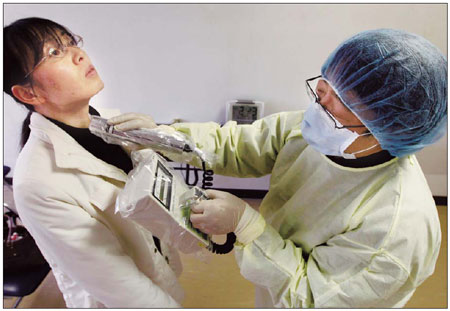Society
A little knowledge can be a dangerous thing
Updated: 2011-03-23 07:40
By Liu Zhihua (China Daily)
Taxi driver Liu Songjiang was working on March 17 when he received a call from his wife telling him to buy salt as stores were running out of the commodity in their Shunyi neighborhood in Beijing. Liu went to five supermarkets and stores in Haidian and Chaoyang districts that afternoon, but ended up empty handed.
The desperate search for salt followed rumors that iodized salt could protect from radiation and the country would soon run out as radioactive particles from the earthquake-damaged nuclear power plant in northeast Japan had polluted the sea.
|
Kiyomi Sugiura, who was evacuated from Fukushima, receives a screening test for traces of nuclear radiation in Yamagata, northern Japan. Yuriko Nakao / Reuters |
In response to a nuclear alert, iodine pills are typically taken to saturate the thyroid with healthy iodine, shielding it from radioactive iodine.
But Guo Qiuju, an expert on radiation protection in the department of technical physics of School of Physics, Peking University, says, "The amount of iodine from the iodized salt that the body can ingest is too small to be useful."
"Having too much salt is actually harmful to health," Guo adds.
Experts further warn that iodine drugs should be used only under the supervision of doctors. In the absence of a nuclear catastrophe, taking the medicine is riskier than doing nothing.
"People panic because they know so little about radioactivity and may have equated the plant accident to nuclear bombing," says Pan Ziqiang, an academic with the Chinese Academy of Engineering, who specializes in radiation protection.
"Natural radioactivity is around us in daily life. Only when radiation rises to a certain level will it do harm to the human body," Pan says.
The health effects of radiation depend on the amount and duration of exposure, Guo says.
High doses of radiation can penetrate the body and harm the DNA, causing cell dysfunction.
Radiation above background level in a short period of time can cause burns or radiation sickness and also significantly raise one's risk of contracting cancer. The link to cancer is, perhaps, one of the reasons why people tend to overestimate the risks of radiation exposure.
Symptoms of radiation sickness include nausea, weakness, hair loss, skin burns and reduced organ function. If the exposure is strong enough, it can cause premature aging or death.
Additionally, organs with faster metabolism, such as the reproductive and digestive systems, will likely suffer more from the effects of radiation, Guo adds.
Usual levels of radiation in the environment are about 2.4 units, known as millisieverts, a year, but this can vary widely, depending on where you live.
The possibility of health damage brought about by radiation is determined by the amount in excess of normal levels, Guo says.
Time is the most important factor to avoid radiation health damage, Guo emphasizes.
At the time of the world's worst nuclear plant accident, the Chernobyl disaster, authorities in the former Soviet Union evacuated local people 36 hours after the accident and made the catastrophe known to the public 60 hours after the accident happened, when countries such as Sweden had already detected unusually high levels of radiation in their territories.
The accident happened at midnight when a reactor suffered a power surge during an experiment, leading to a core explosion.
Large quantities of radioactive fuel and core materials were dispersed into the atmosphere and caused fires and smoke, which increased the emission of radioactive particles.
More importantly, the reactor had not been protected by any kind of hard containment vessel and the smoke mixed with radiation particles were thrust up to 2 km into the atmosphere and moved worldwide by air currents.
Millions of people suffered and are still suffering from the fallout. Many were affected because they consumed polluted milk and vegetables.
Chernobyl was a nightmare, but the same scale of disaster is not likely to happen in Japan, experts predict.
"The Chernobyl disaster was largely due to human errors. Such a large scale release of radiation cannot happen this time," Guo says.
"If the fallout drifts to China, the effect will be next to nothing, as it will have dispersed in the air and sea," says Li Chengcai, an associate professor with the department of atmospheric and oceanic sciences at the School of Physics, Peking University.
"At this time of year the released radioactive materials have no chance of coming near China, either via winds or sea."
If the accident worsens and is not resolved by May, the winds will change and may bring radioactive elements to China, Li says.
Specials

'Super moon'
The "Super Moon" arrives at its closest point to the Earth in 2011.

Radiation test
The probability of being exposed to a life-threatening level of radiation is quite slim.

Panic buying of salt
Worried Chinese shoppers stripped stores of salt on radiation fears.
